Healthcare App Development in 2024: Key Insights
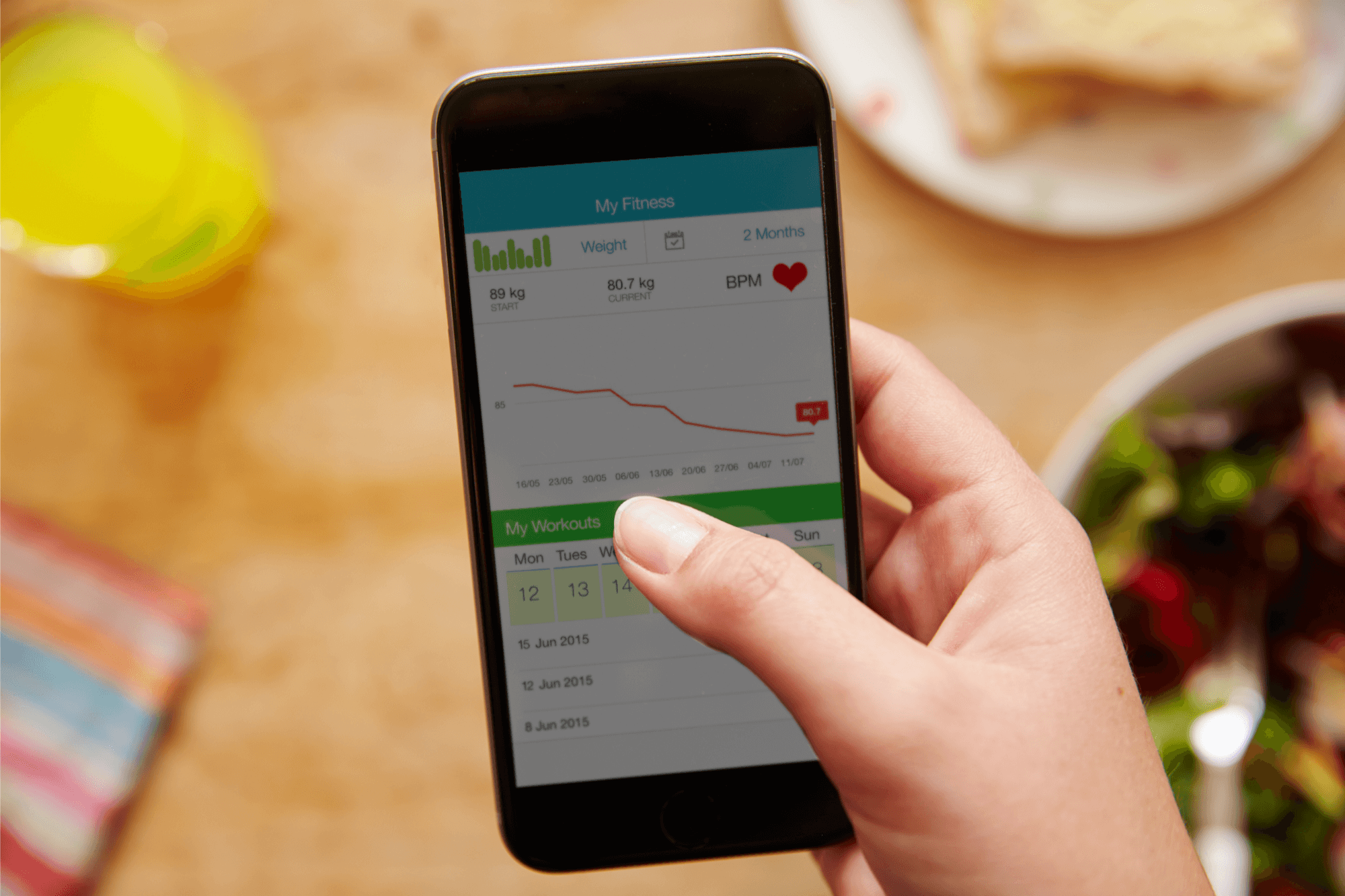
Medical organizations have recognized the immense potential of healthcare app development to improve patient monitoring, medical data management, hospital administration, and more. And the latest statistics confirm the prosperity – by 2026, the market size is predicted to be nearly $660 billion. In the past two years alone, businesses and healthcare investors have poured over $21 billion into digital health projects, underscoring the heightened interest in this sector.
If you wonder how to create a health app, you might belong to one of these forward-thinking organizations. Thankfully, at Relevant, we stand ready to support you on every step of the healthcare app development journey. Our vast expertise in providing modern medical software solutions empowers us to offer a thorough guide encompassing the various types of healthcare software, indispensable features, and the fundamental stages of building a great healthcare app.
from 25 countries outsourced software development to Relevant
We provide companies with senior tech talent and product development expertise to build world-class software.
Healthcare App Development: Overview
Healthcare app development refers to the process of creating digital applications to streamline various aspects of healthcare operations. These applications serve diverse users, ranging from healthcare organizations and medical practitioners to patients.
These applications are often developed with a patient-centric approach in mind, aiming to improve patient care quality and enhance the healthcare experience. They provide a platform where patients can easily access their health records, book appointments, consult with physicians remotely, and manage their medication and treatment schedules.
For healthcare providers, these applications serve as valuable tools to optimize administrative processes, improve patient data management, monitor patient health in real-time, and offer telehealth services, thus enhancing the overall efficiency of their healthcare delivery.
The development of these apps involves a complex process, combining medical knowledge with sophisticated technology. Applications must be user-friendly, easy to navigate, and reliable regarding data accuracy and availability. In addition, the developers must comply with several regulatory standards to ensure data privacy and security.
Health vs. Medical App: What’s the difference?
While often used interchangeably, health and medical apps differ significantly in function, usage, and regulatory requirements.
In its broadest sense, a health app is a software program designed to provide information, motivation, or tracking tools related to personal health and wellness. That can include fitness apps that track physical activity, nutrition apps that help monitor diet, or mental health apps that provide resources for stress management. Essentially, health apps focus on promoting healthy behaviors and general well-being.
On the other hand, medical apps are explicitly designed for diagnosing, treating, or managing diseases or medical conditions. These can include apps that healthcare professionals use for clinical decision-making, apps that allow remote monitoring of patients’ conditions, or medication reminder apps.
Unlike health apps, medical apps are often subject to stringent regulations due to their potential direct impact on patient health. For example, in the United States, healthcare applications that satisfy the requirements of a medical device fall under the jurisdiction of the Food and Drug Administration (FDA).
| Health Apps | Medical Apps | |
| For General Public | -Intended for a wide audience-Can manage health conditions with general information and suggestions -Typically cheaper to develop Can track daily health data | -Designed to support a specific health condition -Provides diagnostic and prescriptive tools -Costlier to develop -Can access electronic health records |
| For Medical Professionals | -Used by healthcare providers for general health management -Do not typically need to adhere to strict medical evidence or regulations | -Used by healthcare providers for diagnosis and treatment based on analytical data -Must comply with testing and regulatory standards -Grants access to comprehensive patient information |
While both health and medical apps play integral roles in the digital healthcare landscape, understanding their differences is crucial. It not only helps developers create appropriate and compliant solutions but also guides users in selecting the right apps for their needs.
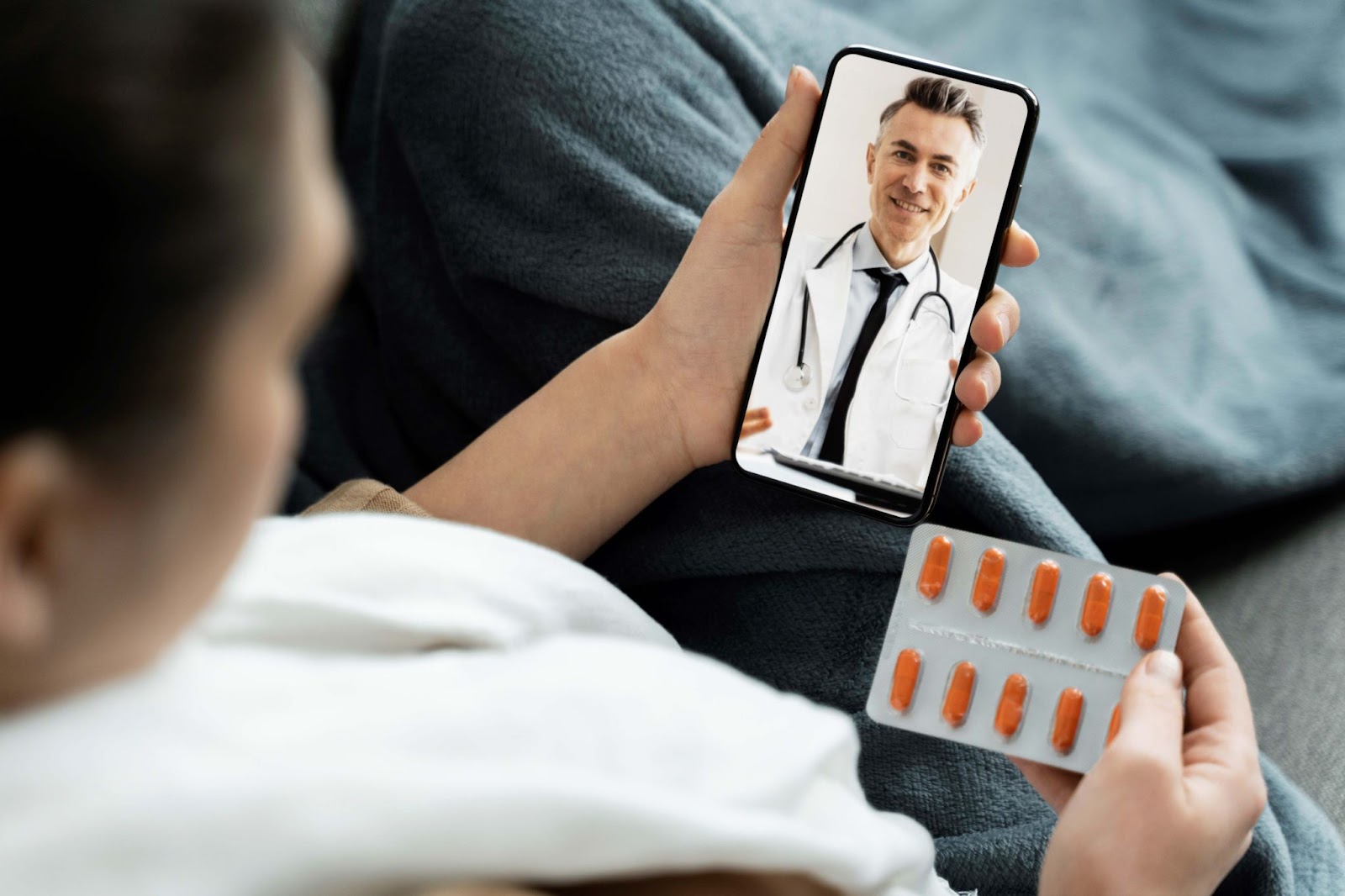
Types of Healthcare Apps
From appointment management and telemedicine applications to patient health trackers and chronic disease management solutions, healthcare apps offer a diverse range of functionalities that empower individuals to take control of their health and improve their overall quality of life. Let’s list the most popular of them:
- Electronic Health Record (EHR) Apps: Facilitate the digital management of patient health information, streamlining access for healthcare providers and patient management staff.
- mHealth Apps: Empower users to track and enhance their well-being by leveraging smartphones and alternative devices.
- Telemedicine Apps: Enable remote consultations, reducing the need for physical doctor visits and improving healthcare accessibility.
- Appointment Management Apps: Simplify the process of scheduling, rescheduling, or canceling appointments, saving time for both patients and providers.
- Medication Management Apps: Help patients adhere to medication schedules, provide reminders, and track medication intake.
- Remote Patient Monitoring (RPM) Apps: Allow healthcare providers to monitor patient health data remotely, which is useful for managing chronic diseases and post-operative care.
- Clinical Reference & Medical Education Apps: Serve as a knowledge hub for healthcare professionals, offering access to medical journals, research, and case studies.
- Medical Imaging Apps: Facilitate the examination and dissemination of diagnostic images, including X-rays, CT scans, and MRIs, among healthcare practitioners.
- Mental Health Apps: Provide resources for managing mental health, including therapy options, stress management techniques, and community support.
- Chronic Disease Management Apps: Tailored to manage specific chronic diseases, like diabetes or heart disease, offering tracking tools, medication reminders, and lifestyle tips.
- Women’s Health Apps: Focus on women’s health issues like pregnancy, menstrual cycle tracking, or menopause management.
- Health and Fitness Apps: Promote a healthy lifestyle through tracking exercise, nutrition, sleep, and more.
- Personal Health Record (PHR) Apps: Allow individuals to maintain their health records, enabling proactive health management.
Legal and Compliance Aspects for Healthcare Apps
Compliance with established regulations is a legal requirement and a marker of trustworthiness and quality assurance for end-users. HIPAA, GDPR, and other worldwide privacy regulations are pivotal pillars of healthcare compliance. These two essential components govern the handling of sensitive medical data, ensuring the utmost security and privacy standards are upheld within the United States and Europe, respectively.
HIPAA Compliance for Healthcare Apps
The Health Insurance Portability and Accountability Act (HIPAA) assumes a paramount role as a regulatory standard for healthcare applications within the United States. It establishes comprehensive guidelines to safeguard and handle protected health information (PHI) confidentially and securely. Any health-focused application that stores, processes, or transmits PHI is mandated to align with HIPAA requirements.
Compliance entails the implementation of suitable technical, physical, and administrative safeguards. That encompasses secure data transmission, stringent access control measures, robust audit control mechanisms, integrity control protocols, and fortified transmission security measures. Adhering to these rigorous standards ensures the utmost protection and privacy of sensitive healthcare data within the app ecosystem.
GDPR and Other Global Privacy Regulations
The European Union has instituted the General Data Protection Regulation (GDPR) as an all-encompassing data protection legislation. This robust law applies to all types of applications, including healthcare apps, that handle the personal data of EU residents, irrespective of the app’s physical location. GDPR compliance revolves around lawfulness, fairness, transparency, data minimization, and accountability. It necessitates obtaining approval from users prior to their data collection while also granting users the prerogative to access, correct, or delete their data.
It’s not solely about the standard requirement of HIPAA or GDPR compliance that becomes imperative whenever handling patients’ protected health information (PHI). Depending on the nature and functionality of your medical application, it is critical to consider other rules like:
- Apple’s Human Interface Guidelines for CareKit and HealthKit.
- Android.os.health documentation for effective integration with Android platforms.
- Compliance with standards such as IEC 62304, ISO27001, SOC2 Type 2, and other relevant regulations to ensure the app’s reliability and security.
- Participation in the MFi Program for seamless integration with Apple’s hardware.
- Adhering to regulations like the HITECH Act, among others, to safeguard data security.
- Implementing encryption and secure connections to transmit patient data to and from the app.
Remember, when you develop a healthcare app, upholding these standards and regulations is crucial to maintaining patient data’s confidentiality and security throughout the app’s operations.
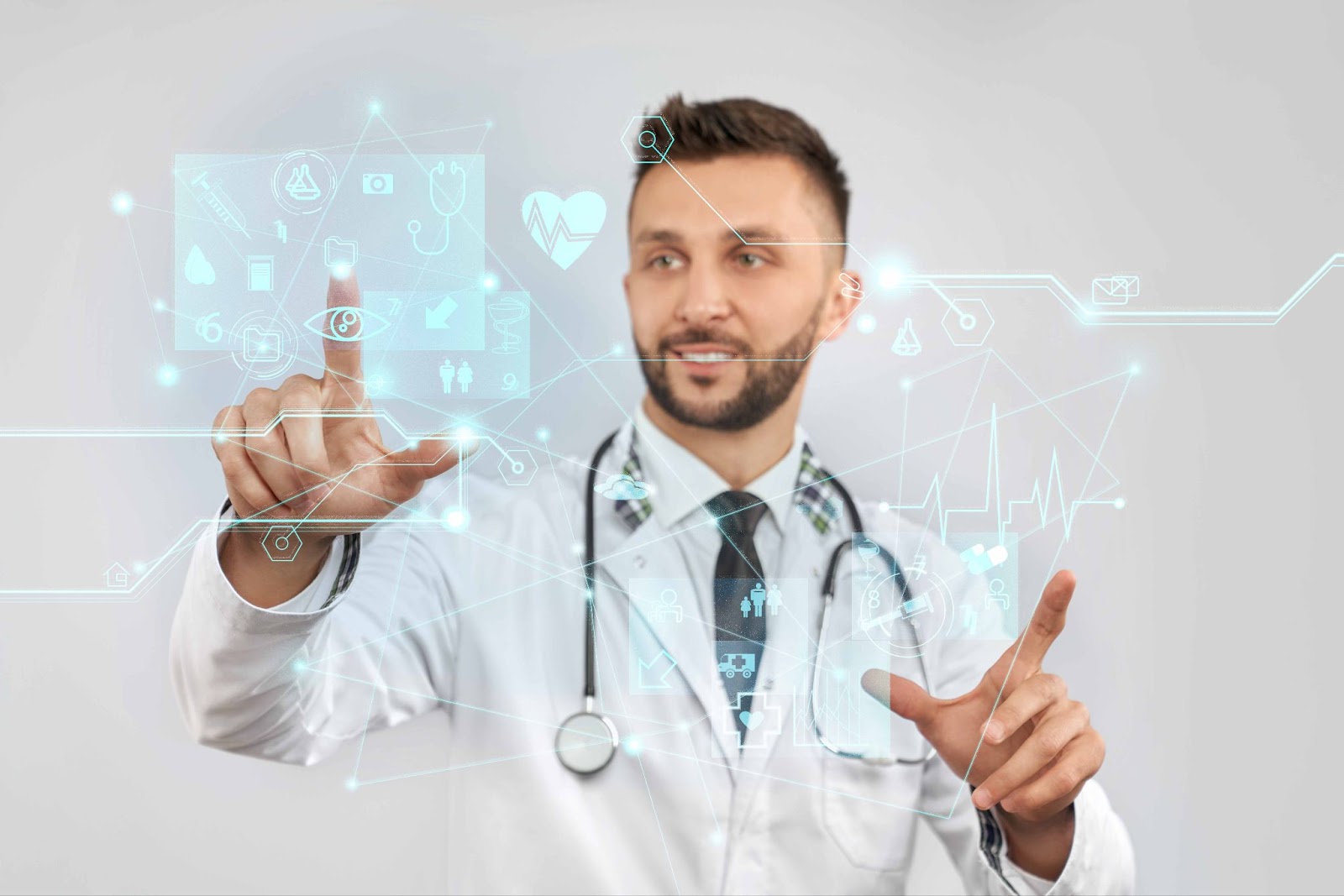
Key Healthcare App Features
Creating an app that includes features that users really want and delivers tangible benefits is critical. Naturally, the choice of these functions depends on the specific focus, whether glucose tracking, fitness, or remote patient monitoring in the case of a mobile medical solution. Yet, any health app aspiring to succeed must encompass a non-negotiable set of features unequivocally addressing the user’s needs.
- Appointment Scheduling and Reminders – enabling users to schedule, alter, or cancel appointments seamlessly while providing timely reminders to ensure no missed medical consultation.
- Telemedicine and Remote Consultations – allow healthcare professionals to provide consultations virtually, enhancing accessibility and ensuring uninterrupted patient care, even from a distance.
- Medication Tracking and Reminders – helps patients adhere to their medication schedules providing reminders and allowing tracking of medication intake.
- Electronic Health Records (EHR) Management – allows easy and secure access to a patient’s comprehensive medical history, ensuring healthcare providers have all necessary information at their fingertips.
- Symptom Checker and Health Assessment Tools – help users understand potential health concerns based on symptoms they’re experiencing, fostering better healthcare decisions.
- Health and Fitness Tracking (e.g., steps, sleep, heart rate) – monitors various health parameters like physical activity, sleep patterns, and heart rate, empowering users to actively participate in their health and wellbeing.
- Integration with Wearable Devices and Sensors – connects the app with various wearable devices and sensors to gather real-time health data, enhancing the accuracy of health tracking and analysis.
- Real-Time Chat – enables swift communication with doctors, facilitating prompt responses, timely medical advice, and enhanced patient-provider relationships.
Despite the diversity of healthcare app features, their unified objective remains to simplify processes for patients and doctors and streamline hospital management.
Top 8 Steps to Build a Healthcare App
Let’s assume you’ve fully decided on creating your healthcare application. Yet, are you aware of how to develop a healthcare app that revolutionizes the market? Read below about healthcare mobile app development to ensure no stone is left unturned.
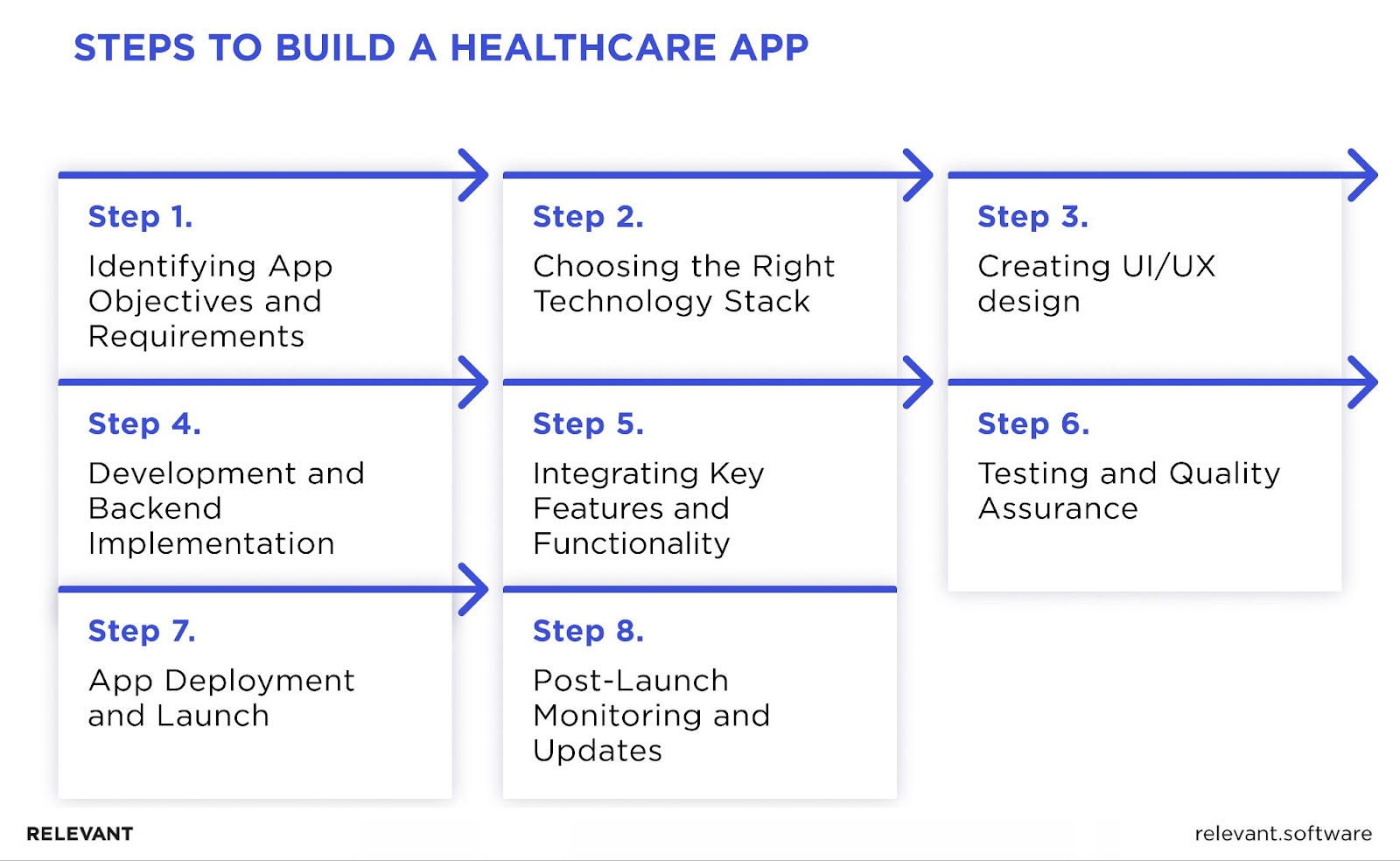
Identifying App Objectives and Requirements
The initial phase entails comprehending the app’s core objective and the specific requirements of its end-users. This includes defining the app’s essential features, target audience, and how it will solve a particular healthcare problem or enhance the healthcare experience.
Choosing the Right Technology Stack
That requires carefully identifying and choosing suitable technologies to drive the app’s development. Factors such as platform compatibility (iOS, Android, or cross-platform), security, scalability, and future maintenance needs are crucial considerations.
Creating UI/UX design
An intuitive and user-friendly design is vital. The UI/UX design should focus on making the app easy to navigate and visually appealing, ensuring that the user’s journey through the app is seamless and efficient.
Development and Backend Implementation
In the core development stage, the app is coded, and backend systems are implemented. That encompasses setting up servers, databases, and APIs, ensuring data security, and creating the app’s core functionalities.
Integrating Key Features and Functionality
Now, it’s time to integrate the app’s critical features, such as appointment scheduling, telemedicine capabilities, and medication reminders. It also ensures the app integrates seamlessly with other systems or devices if needed.
Testing and Quality Assurance
Comprehensive testing to ensure the medical app functions as intended. That includes functional, performance, security, and user acceptance testing because it’s vital to address any found bugs or issues before launch.
App Deployment and Launch
Once the app is thoroughly tested and all issues are resolved, it is deployed on the appropriate app stores. A launch strategy, including marketing and PR activities, should be in place to maximize visibility and downloads.
Post-Launch Monitoring and Updates
After launch, the app needs ongoing monitoring and maintenance to address user feedback, fix bugs, and keep up with changes in technology or healthcare regulations. Regular updates ensure the app remains relevant, secure, and valuable to its users.
Challenges in Building a Healthcare App
Embarking on the journey to create a mobile app development for healthcare presents a unique set of challenges. Among them:
Regulatory Compliance
Staying compliant with numerous healthcare regulations such as HIPAA or GDPR can be an uphill task. These stringent norms require extensive documentation and regular audits and can significantly influence the design and functionality of the app.
Interoperability and Integration
Ensuring the app integrates seamlessly with existing healthcare systems, databases, and third-party applications is a considerable challenge. Achieving interoperability (for example, FHIR) is crucial for the app’s functionality, user convenience, and effectiveness.
User Engagement and Accessibility
Creating an app that captures user interest and keeps them engaged is an ongoing challenge. The application should be uncomplicated, instinctual, and universally approachable, irrespective of users’ tech proficiency or comprehension of health-related information.
Technical Complexity
Healthcare app development involves complex technologies and advanced features. Developers must have a deep understanding of healthcare operations and mastery of technological aspects. If you’re considering app development for healthcare, finding the best healthcare app development company with a diverse and skilled team is vital for completing your project.
Data Privacy and Security
Ensuring sensitive health data’s utmost privacy and security is a non-negotiable requirement in healthcare app development. Protecting this data from breaches and ensuring full compliance with privacy laws is a challenge that healthcare app development companies must solve.
Addressing these challenges head-on is crucial for successful healthcare software development.
The Cost of Developing a Healthcare App
The financial implications of healthcare app development hold significant weight for organizations aiming to materialize their web or mobile health solutions. Drawing from Research2Guidance data, the average expenditure for creating a healthcare app is approximately $425,000. Although the particular investment can fluctuate based on numerous variables, it’s paramount to recognize the fundamental components that drive the cumulative costs.
One of the primary cost determinants is the healthcare app’s complexity. The more complex and feature-rich the app, the higher the development cost is likely to be. Factors such as the number of functionalities, integration with external systems, data processing requirements, and user interface all contribute to the app’s complexity and subsequently impact its cost.
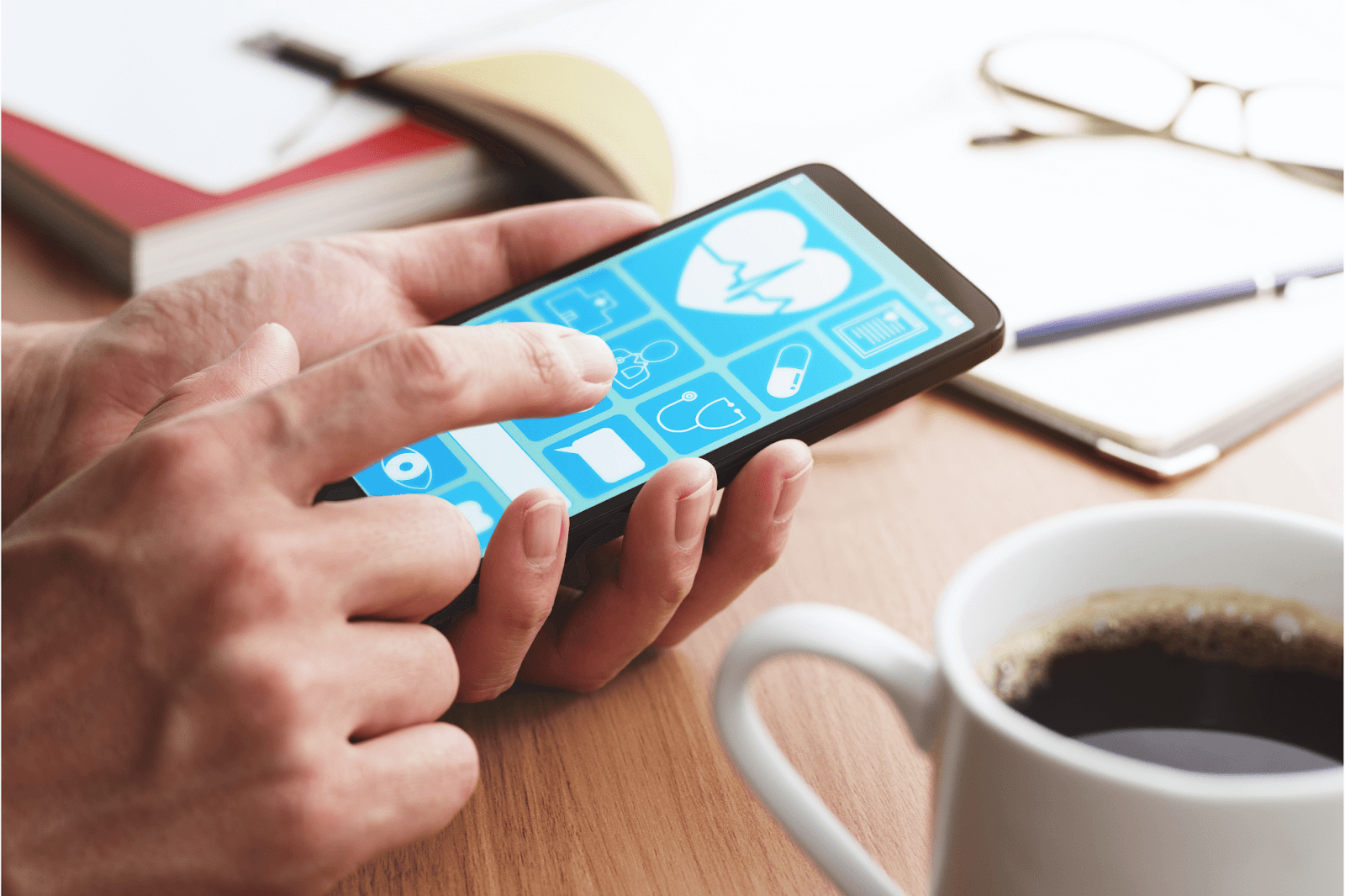
The technology stack chosen for app development healthcare also affects cost estimation. The medical app development for iOS and Android platforms often entails greater expenses compared to cross-platform development. The choice of backend infrastructure, database systems, and cloud services can also influence the overall cost.
Design and user experience considerations are critical components of a successful healthcare app. A well-designed and intuitive user interface enhances user engagement and satisfaction. Investing in UI research, design, and usability testing may incur additional costs but can significantly impact the app’s success and user adoption.
Furthermore, post-launch services, such as updates, maintenance, and support that ensures the app remains functional, secure, and up-to-date, should be factored into the overall cost estimation in healthcare mobile app development services.
Relevant Software as your Technology Partner for Healthcare Development
The healthcare industry is constantly evolving, and with it, so are the technological needs. To stay ahead, your organization or medical startup requires a technology partner who can navigate the complex domain of healthcare development, aligning your vision with industry standards, regulations, and the latest technologies. What are we getting at? Choosing Relevant Software as your technology and IT consulting partner will give you the benefit, and here’s why:
- Industry Expertise: We’ve honed our expertise in custom healthcare app development, creating compliant, user-friendly healthcare apps that solve real-world problems.
- Compliance Knowledge: Our in-depth understanding of regulatory standards like HIPAA and GDPR will ensure your app is compliant, secure, and trusted by its users.
- Innovative Technology: Latest technology trends, including AI, Machine Learning, IoT, and Digital Twin, help us to create healthcare app development solutions that are not only functional but also innovative, keeping you ahead of your competition.
- End-to-End Development: Our approach to web and mobile healthcare app development ensures consistency and high-quality results throughout the project lifecycle – from ideation and design to launch and post-launch support.
- User-Centered Approach: We prioritize the user experience in our healthcare web development process. Our digital healthcare and medical apps are intuitive, user-friendly, and designed to meet the real-world needs of your target audience.
- Scalability and Flexibility: Our team understands that healthcare apps must grow and adapt over time. So we build scalable and flexible solutions, allowing for easy updates and enhancements as your business and user needs evolve.
With Relevant as your healthcare app development company, you’ll get a team as dedicated to your success as yours. Contact us for healthcare app development services, shaping a healthier future for all.
FAQ
What is the difference between health and medical apps?
Health and medical apps are vital in mobile healthcare development. Health apps promote well-being with features like exercise tracking, while medical apps focus on clinical care for diagnosis, monitoring, and treatment. Healthcare professionals utilize medical apps for decision support, references, and patient management.Can both doctors and patients use healthcare apps?
Healthcare mobile app development services are designed to create apps for doctors and patients. Doctors can use healthcare apps to monitor patient health, access medical records, and offer telehealth services. In turn, patients can conveniently book appointments, effortlessly retrieve their medical records, diligently monitor their health advancements, and effectively engage in remote consultations with their healthcare providers.Can you provide examples of successful healthcare apps?
Numerous healthcare app development companies have created successful healthcare apps. These encompass MyChart, an app enabling patients to retrieve their medical records and interact with their healthcare providers, and Medscape, a valuable platform for physicians providing clinical references and updates. Another example is Headspace, a health app focusing on mental wellness through mindfulness and meditation.How much does it cost to develop a healthcare app?
The cost to develop a healthcare app can vary greatly depending on the complexity of the app, the number of features it includes, and the rates of the healthcare app development company you hire. It can range from tens of thousands to several hundred thousand dollars. For a more precise estimate, it’s best to reach out to a healthcare app development company directly.What factors affect the cost of healthcare app development?
Factors impacting healthcare app development costs include feature count, design needs, app complexity, and app development healthcare company location. Custom healthcare app development incurs higher costs than pre-built solutions due to building from scratch.What are the team requirements for healthcare app development?
The team requirements for healthcare app development usually include a project manager, a UI/UX designer, one or more app developers, a quality assurance tester, and sometimes a system administrator, depending on the project scale. If you’re considering app development for healthcare, finding the best healthcare app development company with a diverse and skilled team is vital for completing your project.How to develop a healthcare app?
Whether you’re looking for a healthcare app development company to create a new app or healthcare app development services to improve an existing one, the process involves thorough planning, skilled professionals, and a clear understanding of the end-users needs.

Hand-selected developers to fit your needs at scale! Let’s build a first-class custom product together.

